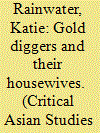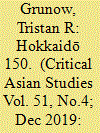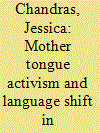|
|
|
Sort Order |
|
|
|
Items / Page
|
|
|
|
|
|
|
| Srl | Item |
| 1 |
ID:
169025


|
|
|
|
|
| Summary/Abstract |
From 1975 to 1990 several hundred thousand Thais became guest workers in the Middle East. Focusing on texts from the period including migrant guidebooks, lyrics, and state publications, this contribution analyzes the gendered political economy of the migration of Thai men to Saudi Arabia, a phenomenon referred to domestically as “gold digging.” While the Thai state imposed restrictions on the export of female laborers, Thai women were nevertheless believed to have an important role in transnational migration as left-behind housewives who offered their husbands long-distance emotional support and regular assurances of their fidelity. This research engages Marxist feminist theory to demonstrate how left-behind wives contributed to and were impacted by their husbands' participation in guest worker programs. It demonstrates that guest worker programs outsource not only intergenerational reproduction to labor-sending communities but also affective dimensions of labor-power renewal. Moreover, the confluence of guest worker programs with patriarchal norms in labor-sending communities may mean that left-behind wives – like guest workers themselves – experience restrictions on their sexuality and freedoms of movement and expression.
|
|
|
|
|
|
|
|
|
|
|
|
|
|
|
|
| 2 |
ID:
169029


|
|
|
|
|
| Summary/Abstract |
This roundtable presents the proceedings of the “Hokkaidō 150: Settler Colonialism and Indigeneity in Modern Japan and Beyond” workshop held at the University of British Columbia in March 2019. The sesquicentennial of Japanese settler colonization of the northern island of Hokkaidō or Ainu Mosir received only scant attention either in Japan or around the world. The goal of this roundtable is to reinsert settler colonialism into modern Japanese history while introducing the case of the Ainu into global conversations of Indigeneity. Katsuya Hirano draws attention to how the Meiji state manipulated ideas of ownership to enable exploitation of Ainu lands. ann-elise lewallen recenters Ainu women’s resistance to the sexual colonization of Hokkaidō. Mai Ishihara interrogates her own positionality and asks why many people with Ainu heritage remain silent. Sheryl Lightfoot reviews how the case of the Ainu in Hokkaidō complicates prevailing paradigms of settler colonial studies. Musicians Mayunkiki, Tomoe Yahata, and Terri-Lynn Williams-Davidson discuss issues of Indigenous identity and their practice. Finally, Danika Medak-Saltzman concludes the roundtable by re-situating Ainu at the intersection of settler colonial and Native studies, challenging Japan scholars to more meaningfully engage and prioritize Indigenous studies.
|
|
|
|
|
|
|
|
|
|
|
|
|
|
|
|
| 3 |
ID:
169028


|
|
|
|
|
| Summary/Abstract |
This article outlines the extracurricular work of education and language revitalization by two non-governmental organizations (NGOs) in Pune, a city in the western Indian state of Maharashtra. It demonstrates how these NGOs respond to anxieties and fears of language shift, language death, and social change in ways that fill a gap in how connections of language to society are addressed in the formal education system in Pune. These NGOs recreate structures of hierarchies among socioeconomic classes in their work of language preservation, assigning to lower classes the task of maintaining Marathi as an everyday language and delegating the promotion of Marathi “high culture” forms such as the arts to the upper classes. The article illuminates ways in which Marathi use and language ideologies shape socioeconomic class identifications and how ideologies about language and language use take different forms based on needs defined through a socioeconomic class lens.
|
|
|
|
|
|
|
|
|
|
|
|
|
|
|
|
| 4 |
ID:
169026


|
|
|
|
|
| Summary/Abstract |
This article juxtaposes two conflicting images of China’s environment during the socialist Mao era. One is an influential scholarly account of environmental destruction due to Mao’s insistence that “man must conquer nature” (ren ding sheng tian). The other, provided by a longtime resident of Kunming, is an idyllic description of an urban material reuse system without waste. The different images involve variances in the very notions of nature and environment on which they are grounded. The former posits the Chinese tian as equivalent to a western environmentalist notion of nature, while the latter corresponds with a Marxist materialist notion that waste is part of nature’s bounty. I explore the politics of fixing translational equivalents in the interplay between history, memory, and power by focusing on excesses of each image: Mao’s tian as an impediment to cultivating collective agency, and forms of industrial pollution that were not signified by “garbage.” Kunming city government documents further highlight crucial rifts in material flows that unfolded through the Mao era, complicating both images. Ultimately, by probing shifting Chinese “natures,” I clear conceptual space for capturing the important roles played by waste matter and practices of frugality in shaping recent Chinese history.
|
|
|
|
|
|
|
|
|
|
|
|
|
|
|
|
| 5 |
ID:
169027


|
|
|
|
|
| Summary/Abstract |
This article contributes to the debate on the role of the Chinese state in economic transition by shedding light on the relationship between the state and a Chinese domestic capitalist class. The formation of this new class has been a two-way movement between the state and new elites’ forces. This two-way movement remains a prominent feature of the relationship between the state and the new class. This relationship has evolved with the dynamics of capital-labor conflicts and contradictions within a regime of accumulation and transitioned from a stage of “great compromise” to a stage of “strained alliance.”
|
|
|
|
|
|
|
|
|
|
|
|
|
|
|
|
| 6 |
ID:
169023


|
|
|
|
|
| Summary/Abstract |
Contemporary Chinese feminism has drawn much attention in academe and popular media, yet its ontological roots and the politics of naming has largely escaped scrutiny. This paper first demonstrates that China’s post-socialist transition has given rise to a new gendered structure of power, in response to which urban young women have assembled various discursive and material practices in their struggles. Second, the social rupture and shock caused by these practices have led to the popular perception that an undifferentiated “feminism” has been proliferating in contemporary China. Combining historiographical and ethnographic research, this paper maps out the overall landscape of women’s agitations and identifies two latent strands of “made-in-China feminism” – with varied sociopolitical significance – that engage with cultural norms at the grassroots level. In grasping China’s ongoing gender antagonism with its full complexity, this paper discusses the limitations of existing scholarly approaches to contemporary Chinese feminism. This analysis contributes to the ongoing conversation on imagining a feminist politics in non-Western societies that disrupts the political, economic, and cultural orders all at once.
|
|
|
|
|
|
|
|
|
|
|
|
|
|
|
|
| 7 |
ID:
169024


|
|
|
|
|
| Summary/Abstract |
Development policy and practice is replete with assumptions that local “communities” have both the willingness and capability to adapt to socio-environmental changes and become “resilient” to multiple old and new challenges. This paper analyzes socio-environmental change processes in a dynamic peri-urban context in the Kathmandu Valley of Nepal, and argues that unequal power relations between diverse actors and their differing interests refute notions of “collective action” and “community resilience.” Residents of peri-urban communities are diverse, have varying abilities and interests, and use different strategies and actions in response to complex socio-environmental changes. These differences reduce insecurities for some while reproducing inequalities for others. These interrelations at the local level are driven by wider socio-economic, political, and institutional processes that transcend community boundaries, interests, and benefits. In the face of these complexities, “community resilience” is an unviable, externally defined, and engineered goal, often at odds with the power discrepancies and heterogeneity found within actual communities. These findings suggest a need to pay attention to the social, economic, and political dynamics of socio-environmental changes that simultaneously shape local communities and their members’ abilities to respond to changes at various scales.
|
|
|
|
|
|
|
|
|
|
|
|
|
|
|
|
|
|
|
|
|